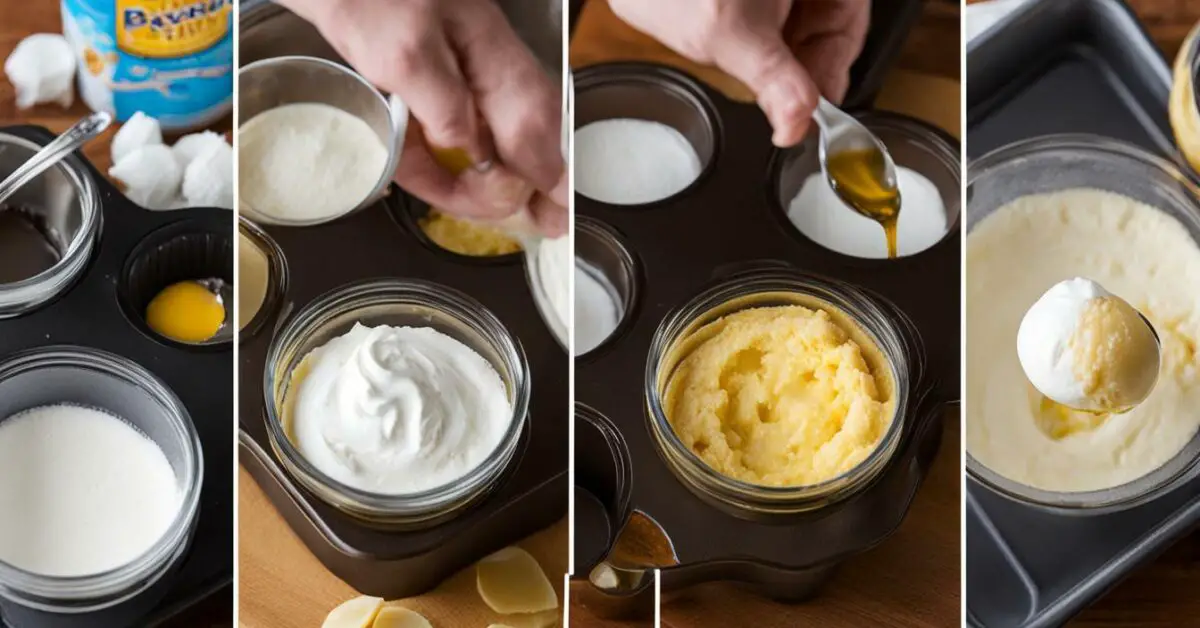
This post may contain affiliate links. Please read my disclosure for more information.
Explore the best substitutes for baking powder in biscuits to enhance your baking experience.
Key Takeaways:
- Buttermilk and baking soda can be used to replace baking powder in biscuits.
- Plain yogurt and baking soda are another alternative for baking powder in biscuits.
- Molasses can be combined with baking soda to create a substitute for baking powder in biscuits.
- Cream of tartar and baking soda can be used in a 2:1 ratio to replace baking powder in biscuits.
- Sour milk, made with vinegar or lemon juice, can be used as a substitute for baking powder in biscuits.
- Vinegar and baking soda can be combined to create a substitute for baking powder in biscuits.
Buttermilk and Baking Soda as a Substitute
One popular substitute for baking powder in biscuits is buttermilk and baking soda. When you run out of baking powder, this combination can help you achieve light and fluffy biscuits without compromising on taste. For every teaspoon of baking powder needed, simply add 1/2 cup of buttermilk and 1/4 teaspoon of baking soda.
Buttermilk provides acidity, which activates the baking soda and helps the biscuits rise. The tangy flavor of buttermilk also adds a delicious twist to the classic biscuit recipe. To use this substitute, mix the buttermilk and baking soda together until well combined, and then incorporate it into your biscuit dough as you normally would.
It’s important to note that buttermilk and baking soda may slightly alter the taste and texture of your biscuits compared to using baking powder. However, many people enjoy the unique flavor profile that this substitute brings. Feel free to experiment and adjust the measurements to your preference, keeping in mind the general ratio of 1/2 cup buttermilk to 1/4 teaspoon baking soda for each teaspoon of baking powder.
| Substitute | Measurement | For 1 teaspoon of Baking Powder |
|---|---|---|
| Buttermilk and Baking Soda | 1/2 cup + 1/4 teaspoon | Light and fluffy biscuits with a tangy flavor |
Remember, baking is a science and slight variations in ingredients may yield different results. It’s always a good idea to test the substitute in a small batch before making larger quantities. So next time you find yourself without baking powder, give buttermilk and baking soda a try for biscuits that are sure to impress!
Plain Yogurt and Baking Soda as a Substitute
Another effective substitute for baking powder in biscuits is plain yogurt and baking soda. To use this alternative, simply combine 1/2 cup of plain yogurt with 1/4 teaspoon of baking soda for every teaspoon of baking powder required in your recipe.
Plain yogurt contains lactic acid, which reacts with baking soda to create carbon dioxide bubbles, providing the leavening effect needed in biscuits. The tangy flavor of the yogurt can also add a delightful taste to your baked goods.
To ensure the best results, it is important to mix the plain yogurt and baking soda thoroughly, ensuring that the baking soda is evenly distributed throughout the yogurt. This will help to activate the leavening process and create fluffy, delicious biscuits.
| Substitute | Measurement | Replaces |
|---|---|---|
| Plain Yogurt and Baking Soda | 1/2 cup of plain yogurt + 1/4 teaspoon of baking soda | 1 teaspoon of baking powder |
Summary:
- Plain yogurt and baking soda can be used as a substitute for baking powder in biscuits.
- Combine 1/2 cup of plain yogurt with 1/4 teaspoon of baking soda for every teaspoon of baking powder needed.
- Mix the yogurt and baking soda thoroughly for even leavening.
- Enjoy fluffy, flavorful biscuits with this alternative.
Molasses as a Substitute
If you’re looking for a unique substitute for baking powder in biscuits, consider using molasses. This sweet and rich ingredient can add depth of flavor to your biscuits while also providing the necessary leavening effect. To use molasses as a substitute, combine 1/4 cup of molasses with 1/4 teaspoon of baking soda for every teaspoon of baking powder required in your recipe.
The combination of molasses and baking soda helps create the necessary rise in your biscuits. The molasses adds a touch of sweetness and a slightly caramelized flavor, making your biscuits truly exceptional. Be sure to whisk the molasses and baking soda together until well combined before adding it to your biscuit dough.
When using molasses as a substitute, keep in mind that it may alter the color of your biscuits. They might turn out slightly darker and have a richer hue due to the molasses. However, this can also add a beautiful visual appeal to your baked goods.
| Baking Powder (teaspoons) | Molasses (cups) | Baking Soda (teaspoons) |
|---|---|---|
| 1 | 1/4 | 1/4 |
| 2 | 1/2 | 1/2 |
| 3 | 3/4 | 3/4 |
Experimenting with different substitutes for baking powder in biscuits can yield delightful results, and molasses is a fantastic option to consider. Its unique flavor and leavening properties make it an excellent alternative. Try using molasses in your biscuit recipe and enjoy the sweet and flavorful twist it adds.
Cream of Tartar and Baking Soda as a Substitute
Cream of tartar and baking soda can be a reliable alternative to baking powder in biscuits. When combined in the right proportions, they can help achieve the desired rise and texture. To substitute for one teaspoon of baking powder, you will need 1/2 teaspoon of cream of tartar and 1/4 teaspoon of baking soda.
When using cream of tartar and baking soda as a substitute, it’s important to mix them together thoroughly before incorporating them into your biscuit dough. This ensures even distribution and activation of the leavening agents during baking.
It’s worth noting that cream of tartar and baking soda work best when there is an acidic ingredient present in the recipe, such as buttermilk or yogurt. The acid helps activate the leavening agents, resulting in a lighter and fluffier biscuit.
| Ingredient | Measurement |
|---|---|
| Cream of Tartar | 1/2 teaspoon |
| Baking Soda | 1/4 teaspoon |
Experimenting with different substitutes for baking powder in biscuits can be a fun and creative way to adapt recipes to your preferences or pantry availability. Remember to adjust the quantities and ratios accordingly to achieve the desired results. With the right combination of ingredients, you can still enjoy delicious homemade biscuits even without traditional baking powder.
Sour Milk as a Substitute
Don’t worry if you don’t have baking powder on hand; sour milk can serve as a suitable alternative in biscuits. Made by adding one tablespoon of vinegar or lemon juice to one cup of milk, sour milk can provide the necessary leavening agents to help your biscuits rise.
To use sour milk as a substitute for baking powder, you’ll need to adjust your recipe accordingly. For every teaspoon of baking powder required, replace it with a combination of 1/2 teaspoon of baking soda and 1/2 cup of sour milk. The acidity in the milk reacts with the baking soda, creating carbon dioxide bubbles that contribute to the light and airy texture of your biscuits.
When using sour milk as a substitute, it’s important to remember that the tangy flavor of the milk may slightly alter the taste of your biscuits. However, this can also add a unique and pleasant twist to your recipe. Feel free to experiment with different types of milk, such as whole milk or buttermilk, to achieve your desired flavor profile.
| Baking Powder (teaspoons) | Baking Soda (teaspoons) | Sour Milk (cups) |
|---|---|---|
| 1 | 1/2 | 1/2 |
| 2 | 1 | 1 |
| 3 | 1 1/2 | 1 1/2 |
Remember, baking is a science, and substitutions may not always yield the exact same results as using baking powder. However, by exploring different alternatives like sour milk, you can still achieve delicious and fluffy biscuits without compromising on taste or texture.
Vinegar and Baking Soda as a Substitute
Vinegar and baking soda can be a handy substitute for baking powder in biscuits. This combination creates a reaction that helps the biscuits rise, resulting in a light and fluffy texture. To use vinegar and baking soda as a substitute, you will need to mix 1/2 teaspoon of vinegar with 1/4 teaspoon of baking soda for every teaspoon of baking powder required.
When adding vinegar and baking soda to your biscuit recipe, it is important to mix them separately before incorporating them into the dough. This allows the reaction between the two ingredients to occur, giving the biscuits the lift they need. You can then add the vinegar and baking soda mixture to your dry ingredients, following the recipe instructions accordingly.
It’s worth noting that vinegar has a distinct flavor, so the resulting biscuits may have a slight tang. However, this can complement certain dishes and add a unique twist to your biscuits. If you prefer to minimize the vinegar taste, you can use apple cider vinegar, which has a milder flavor compared to white vinegar.
| Vinegar and Baking Soda Substitute | Measurement |
|---|---|
| Baking Powder | 1 teaspoon |
| Vinegar | 1/2 teaspoon |
| Baking Soda | 1/4 teaspoon |
Experimentation is key when substituting baking powder in biscuits. While vinegar and baking soda can be an effective alternative, feel free to try other substitutes mentioned in this article and find the one that suits your taste preferences and dietary restrictions best.
Conclusion
When baking biscuits without baking powder, there are multiple substitutes to choose from, so don’t be afraid to get creative in the kitchen. If you run out of baking powder, there’s no need to panic. You can still achieve fluffy, delicious biscuits using alternative ingredients that you may already have in your pantry.
One option is to use buttermilk and baking soda. By combining 1/2 cup of buttermilk with 1/4 teaspoon of baking soda for every teaspoon of baking powder needed, you can create a suitable substitute. The acidity in the buttermilk reacts with the baking soda to provide the leavening effect required for light and airy biscuits.
Another substitute you can try is plain yogurt and baking soda. The proportions remain the same as buttermilk, with 1/2 cup of plain yogurt and 1/4 teaspoon of baking soda replacing one teaspoon of baking powder. The tanginess of the yogurt and the reaction with the baking soda will help your biscuits rise and maintain their structure.
If you prefer a slightly different flavor profile, molasses can be used as a substitute. Simply mix 1/4 cup of molasses with 1/4 teaspoon of baking soda for every teaspoon of baking powder required. The molasses adds a rich and distinct taste to your biscuits, while the baking soda provides the necessary leavening.
Other substitutes include cream of tartar and baking soda, sour milk made with vinegar or lemon juice, and vinegar and baking soda. Each of these options has its own unique properties, providing different flavors and textures to your biscuits. So, don’t be afraid to experiment and find the substitute that suits your taste preferences.
In conclusion, when you find yourself without baking powder, there’s no need to worry. With the right substitutes, such as buttermilk, yogurt, molasses, cream of tartar, sour milk, or vinegar, you can still achieve delicious, fluffy biscuits. So, get creative and enjoy the process of experimenting with different alternatives to create your perfect batch of biscuits without baking powder.
FAQ
What are the best ways to substitute for baking powder in biscuits?
There are several alternatives you can use as a substitute for baking powder in biscuits. Some options include buttermilk and baking soda, plain yogurt and baking soda, molasses and baking soda, cream of tartar and baking soda, sour milk, and vinegar and baking soda.
How do I substitute buttermilk and baking soda for baking powder in biscuits?
To substitute buttermilk and baking soda for baking powder in biscuits, add 1/2 cup of buttermilk and 1/4 teaspoon of baking soda for every teaspoon of baking powder needed.
Can I use plain yogurt and baking soda as a substitute for baking powder in biscuits?
Yes, you can use plain yogurt and baking soda as a substitute. Use the same proportions as buttermilk, adding 1/2 cup of plain yogurt and 1/4 teaspoon of baking soda for every teaspoon of baking powder needed.
How can I use molasses as a substitute for baking powder in biscuits?
To use molasses as a substitute, combine 1/4 cup of molasses with 1/4 teaspoon of baking soda for every teaspoon of baking powder needed.
What is the ratio for using cream of tartar and baking soda as a substitute for baking powder in biscuits?
The ratio for using cream of tartar and baking soda is 2:1. Use 1/2 teaspoon of cream of tartar and 1/4 teaspoon of baking soda to replace one teaspoon of baking powder in biscuits.
How do I make sour milk to use as a substitute for baking powder in biscuits?
To make sour milk, add one tablespoon of vinegar or lemon juice to one cup of milk. This sour milk can be used in combination with baking soda as a substitute for baking powder in biscuits.
Can vinegar and baking soda be used as a substitute for baking powder in biscuits?
Yes, vinegar and baking soda can be combined as a substitute. Use 1/2 teaspoon of vinegar and 1/4 teaspoon of baking soda to replace one teaspoon of baking powder in biscuits.


